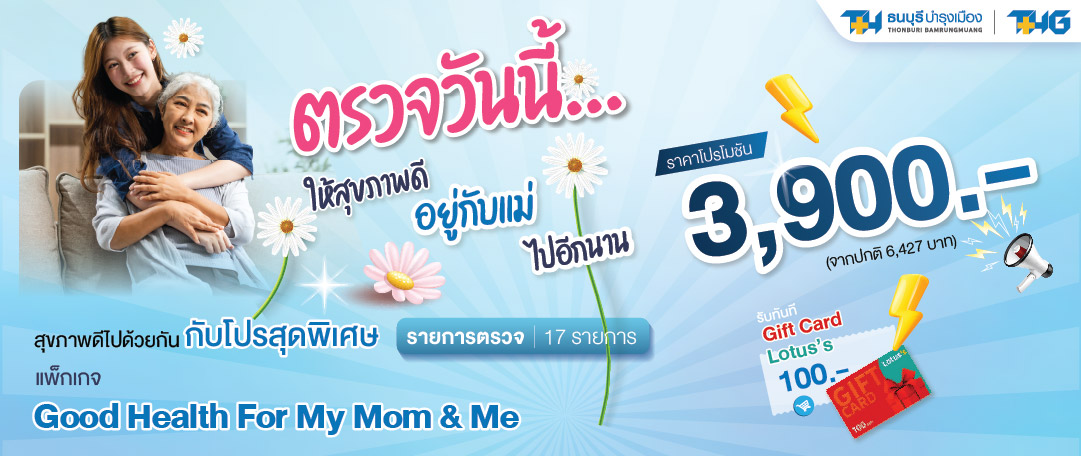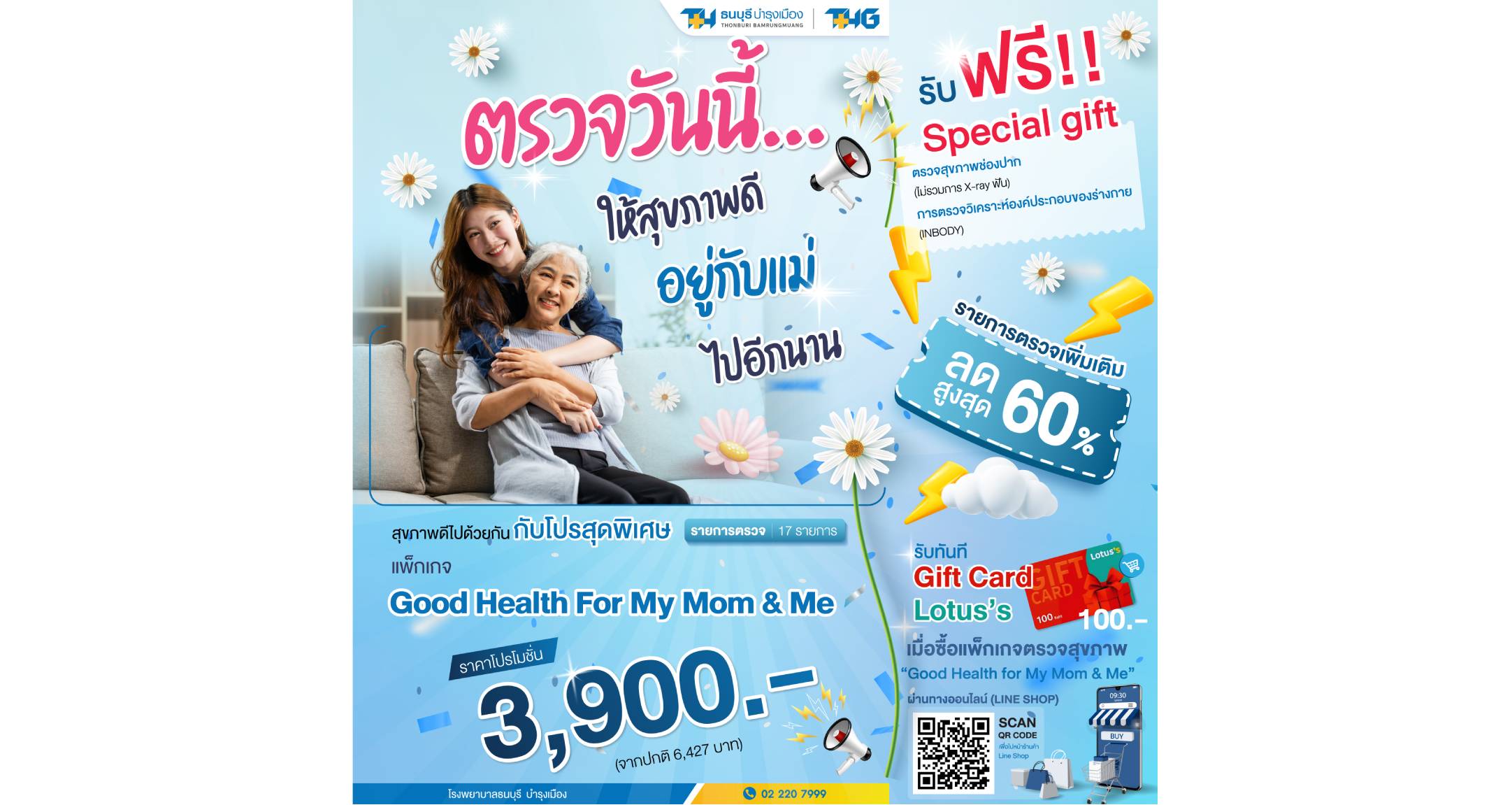
Welcome
to the website of
Thonburi Bamrungmuang Hospital.
Forgot password
Please enter your email to create a new password.

Welcome
Access the website
Thonburi Bamrungmuang Hospital.
Create a new account
Verify by email
Verify by Phone number
Please enter the verification code.
Please enter the 6-digit verification code sent to
News and health articles
Recommended Package
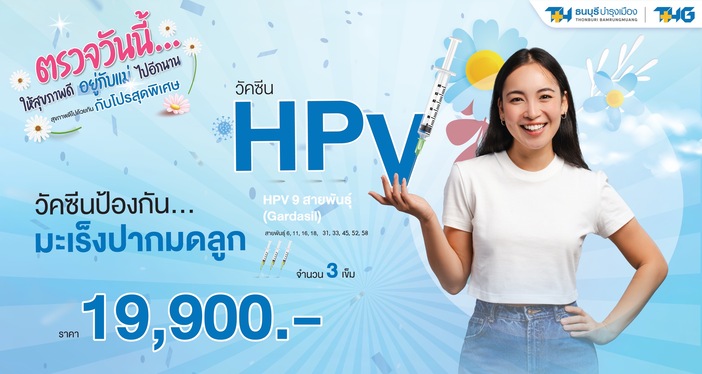
แพ็กเกจวัคซีนป้องกันมะเร็งปากมดลูก HPV 9 สายพันธุ์
ต้อนรับวันแม่ กับแคมเปญ ตรวจวันนี้...ให้สุขภาพดี อยู่กับแม่ไปอีกนาน สุขภาพดีไปด้วยกัน กับโปรสุดพิเศษ แพ็กเกจวัคซีนป้องกันมะเร็งปากมดลูก HPV 9 สายพันธุ์ (Gardasil) จํานวน 3 เข็ม - 19,900 บาท
19,900.00 Baht
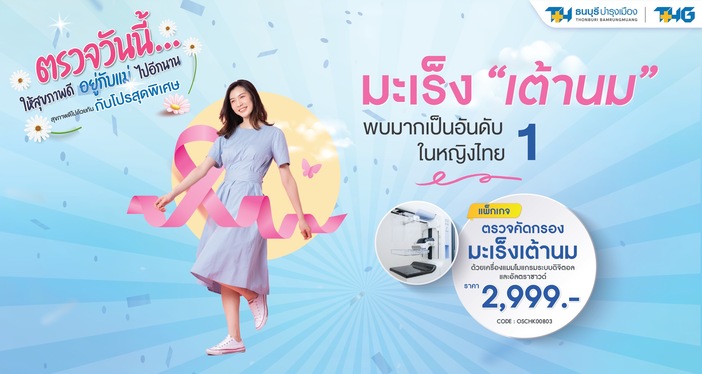
แพ็กเกจตรวจคัดกรองมะเร็งเต้านม
ต้อนรับวันแม่ กับแคมเปญ ตรวจวันนี้...ให้สุขภาพดี อยู่กับแม่ไปอีกนาน สุขภาพดีไปด้วยกัน กับโปรสุดพิเศษ แพ็กเกจตรวจคัดกรองมะเร็งเต้านม ด้วยเครื่องแมมโมแกรมระบบดิจิตอลและอัลตราซาวด์ - 2,999 บาท
2,999.00 Baht
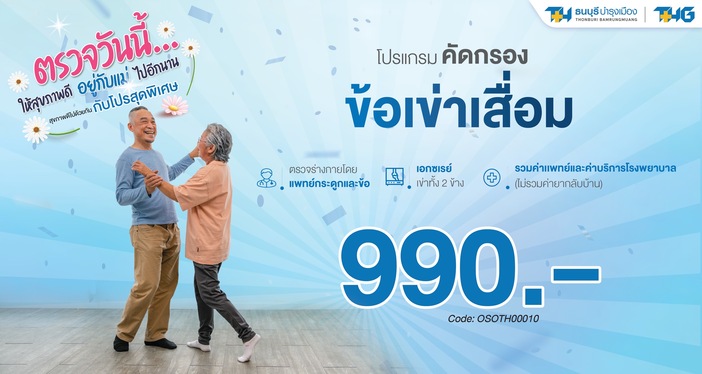
โปรแกรมคัดกรองข้อเข่าเสื่อม
ต้อนรับวันแม่ กับแคมเปญ ตรวจวันนี้...ให้สุขภาพดี อยู่กับแม่ไปอีกนาน สุขภาพดีไปด้วยกัน กับโปรสุดพิเศษ โปรแกรมการตรวจข้อเข่าเสื่อมด้วยเอกซเรย์ (X-ray) - 990 บาท
990.00 Baht
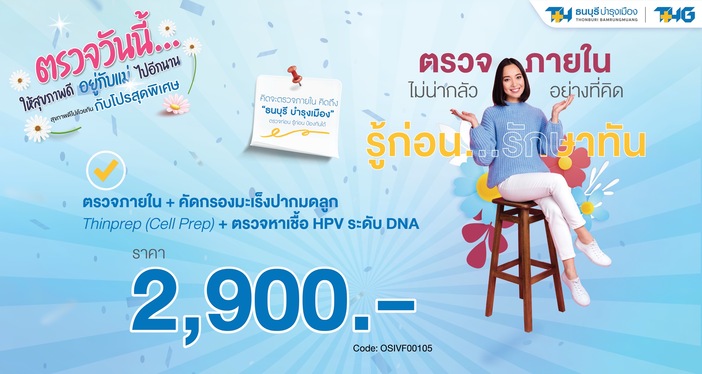
แพ็กเกจตรวจคัดกรองมะเร็งปากมดลูก
ต้อนรับวันแม่ กับแคมเปญ ตรวจวันนี้...ให้สุขภาพดี อยู่กับแม่ไปอีกนาน สุขภาพดีไปด้วยกัน กับโปรสุดพิเศษ แพ็กเกจตรวจภายใน + คัดกรองมะเร็งปากมดลูก + ตรวจหาเชื้อ HPV ระดับ DNA - 2,900 บาท
2,900.00 Baht

แพ็กเกจวัคซีนป้องกันไข้หวัดใหญ่ 3 สายพันธุ์
แพ็กเกจวัคซีนป้องกันไข้หวัดใหญ่ 3 สายพันธุ์ (1 เข็ม) - ราคา 690 บาท
690.00 Baht

แพ็กเกจตรวจหาหินปูนในหลอดเลือดหัวใจ (CALCIUM SCORE)
รายการในแพ็กเกจ : แพ็กเกจตรวจหาหินปูนในหลอดเลือดหัวใจ(Calcium Score) - 1,999 บาท กรุณานัดหมายก่อนเข้ารับบริการอย่างน้อย 2 วัน ตั้งแต่วันนี้ - 31 สิงหาคม 2568
1,999.00 Baht
Testimonial

Anchalee B.
Thailand
ขอบคุณโรงพยาบาลธนบุรีบำรุงเมือง ที่ดูแลประดุจ VIP ขอบคุณพี่อ่องที่แนะนำแพคเกจนี้ให้ โรงพยาบาลสะอาด สวยงาม เจ้าหน้าที่น่ารัก ที่จอดรถสะดวก

MR. KYAW. S
Myanmar, Yangon
Check-up program went really well without any issues at all. Thank you everyone for your warm hospitality.

MR. TUN TIN
Myanmar, Myitkyina
My cancer (RCC) was successfully removed by Dr. Bannasit. I’m now very happy to see my beloved ones at home. Heartful thanks to Dr. Noppasith & Myanmar staff too.

Supakran R.
Thailand
ขอบคุณ “คุณนิค” ที่อำนวยความสะดวก และเดินตั้งแต่จุด 1 ถึงจุด 3 ดูแลตลอดการตรวจ (น่ารักมากๆๆ) ส่วนบริการก็ 10 10 10 ไปเลยค้า

DR. ADNAN F.
Qatar, Doha
A world-class team of doctors, specialist & care givers in an ultra-modern facility. Treatment was holistic & excellent. I highly recommend to all Qataris.

MR. ALI
Qatar
My treatment has been a success. I was well taken care of by Managements, doctors, nurses & all the staff.
+66 2220 3899
Make an appointment, call an ambulance. Available for service 24 hours a day.
+66 2220 7999
Available for service 24 hours a day.

โรงพยาบาลธนบุรี บำรุงเมือง
611 ถนนบำรุงเมือง แขวงคลองมหานาค เขตป้อมปราบศัตรูพ่าย กรุงเทพมหานคร 10100
Contact number
+66 2220 7999
Info@thonburibamrungmuang.com
Edit voucher recipient email address
scan to use
Send as gift
Quantity : Package
Popular search terms
undefined
Complete
Error
Warning





